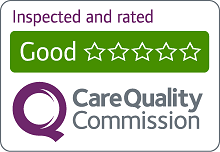Are you noticing that your older loved ones are beginning to need more support at home? Perhaps your dad has recently had a fall, or your aunt finds the weekly shopping trip increasingly difficult.
Watching those we care about age can be challenging, and as they grow older, they may require additional assistance to maintain their independence. If you are considering live-in care for a loved one, you may also be thinking about other important matters, such as power of attorney.
In this guide, we explore how power of attorney and live-in care can work together to provide reassurance, so you can ensure your loved one remains independent with the right support while having their future decisions safeguarded by someone they trust.
Power of Attorney Meaning
Before looking at how power of attorney connects to live-in care, it’s important to understand what it entails. Simply put, power of attorney is a legal document that allows a trusted individual to make decisions on someone’s behalf in key areas such as finances, healthcare, and personal affairs. This ensures that if your loved one ever becomes unable to make decisions for themselves, someone they trust is legally able to act in their best interests.
In the UK, power of attorney can be established for various aspects of life, including personal, business, and legal matters. This legal safeguard offers peace of mind, helping families ensure that their loved one’s affairs are managed properly as they age or face health challenges.
The Different Types of Power of Attorney
1. Ordinary Power of Attorney
This is typically used for financial matters when the individual still has full mental capacity. It allows someone to temporarily manage finances, such as handling bills or banking, and is commonly used if your loved one is travelling or temporarily unable to manage their own affairs. However, it becomes void if they lose mental capacity.
2. Lasting Power of Attorney (LPA)
This is especially important for those who want to ensure that their affairs are managed should they lose mental capacity in the future. There are two types of LPA:
- Financial LPA: Grants the attorney authority over financial decisions, such as managing bank accounts, paying bills, or even selling property if necessary.
- Health and Welfare LPA: Allows the attorney to make decisions about healthcare and personal welfare, including medical treatment and living arrangements, such as whether your loved one should receive live-in care or move to a care home.
The LPA is the most common choice for those wanting to plan ahead and ensure their loved one’s needs are met in the future.
3. Enduring Power of Attorney (EPA)
Before 2007, the Enduring Power of Attorney was the standard legal document for financial decisions. While EPAs are now largely obsolete, any that were set up before the introduction of the LPA remain valid. However, EPAs do not cover health and welfare decisions.
How to Get Power of Attorney
The process of obtaining power of attorney varies depending on location, but the general steps include:
- Choosing an Attorney: Your loved one should select someone they trust completely. This could be a family member, close friend, or professional advisor.
- Completing the Necessary Forms: For an LPA, the required documents must be completed while your loved one still has full mental capacity.
- Registering the Power of Attorney: To be legally valid, the document must be registered with the appropriate authority. In the UK, this is the Office of the Public Guardian (OPG).
How to Apply for Power of Attorney
If you’re wondering how to apply for power of attorney for a loved one, the process typically involves:
- Filling out LPA forms with details about the attorney and their powers.
- Your loved one signing the forms alongside their appointed attorney and witnesses, while they have mental capacity.
- Submitting forms to the OPG for official registration, a process which can take several weeks.
Once registered, the appointed attorney can begin making decisions, but only in areas specified in the power of attorney document.
Power of Attorney and Live-in Care
Live-in care allows a caregiver to reside in your loved one’s home, offering support with daily tasks, healthcare needs, and companionship. This is often a preferred option for those who wish to remain in a familiar environment rather than move into residential care.
A Health and Welfare LPA is especially important in live-in care arrangements. If your loved one loses the ability to make care decisions, their attorney ensures their needs are met, such as deciding if live-in care remains appropriate.
The Role of an Attorney in Live-in Care
Having a Lasting Power of Attorney for health and welfare ensures decisions align with your loved one’s best interests. Their attorney can:
- Decide between live-in care versus residential care.
- Manage healthcare decisions, including treatments and daily welfare.
- Coordinate support services based on your loved one’s preferences.
Why Consider Power of Attorney Alongside Live-in Care?
Arranging power of attorney alongside live-in care is practical and reassuring. It ensures your loved one’s financial, medical, and care decisions are responsibly managed by someone trustworthy. This combination maintains their independence while safeguarding their health, finances, and overall well-being.
